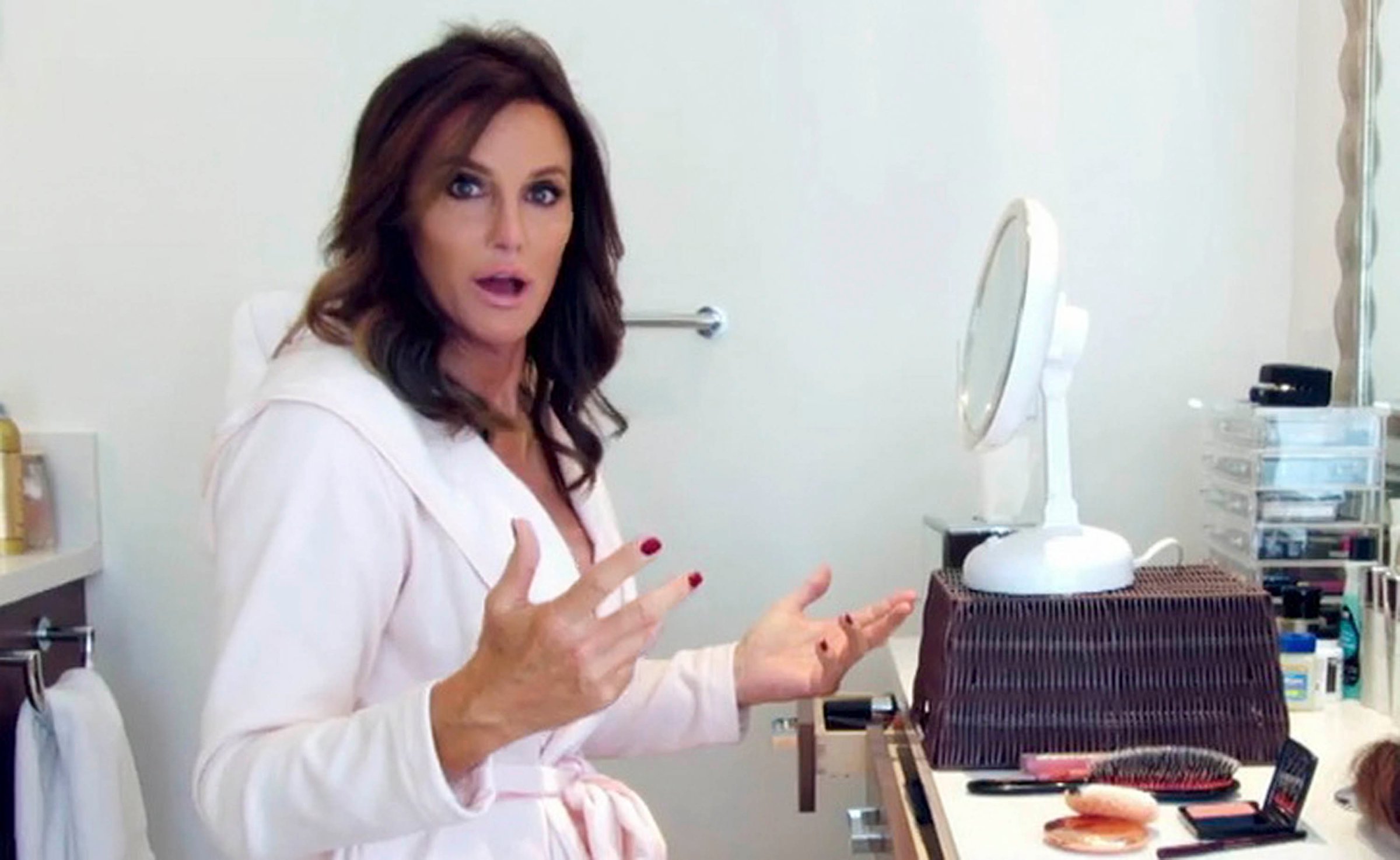
Caitlyn Jenner, at age 65, is getting ready to introduce herself to her mother for the first time. She’s nervous because her mother Esther Jenner knows her–like we did–as Bruce Jenner. And because the former Olympic gold medalist and Keeping Up With the Kardashians dad is reintroducing herself to the world as the most visible and thus scrutinized transgender person in America. “I hope I get it right,” she says with a sigh.
I Am Cait (which premieres July 26 on E!) is very un-Kardashians-like in its earnestness and conscious of its dual purpose: a personal story played out for an audience of millions, on behalf of an entire community. The premiere episode is emotional but controlled, much like Jenner’s carefully media-managed coming out, from her Diane Sawyer prime-time interview to the sultry cover of Vanity Fair to her heart-tugging acceptance of the Arthur Ashe Courage Award from ESPN.
But at its most affecting it’s about something that can’t be massaged and mediated: a woman aspiring to live an honest life with her family, trying to close the decades-old gap between her self-image and her self-presentation.
Esther is almost as important to the opening hour as her daughter is, serving as a surrogate for viewers new to transgender issues. At 89, she is adaptable, stumbling over the pronouns–“He’s a very good-looking woman”–and wrestles with the complexities by holding to the simple fact that her child remains her child. “I loved him with all my heart,” she says, “and I certainly love her with all my heart.”
It’s not easy for her, nor is it easy for Caitlyn Jenner–herself, after all, a senior citizen who’s spent a lifetime absorbing gender assumptions even as she chafed against them. But Jenner, who could come across awkward and guarded as Bruce–living a secret, she says, made her “an isolationist”–now seems free and funny. “Now I know why girls need a sports bra!” she exclaims while playing tennis with her sister.
The lighter moments come via drop-ins from the extended Jenner-Kardashian clan. Jenner gets green hair extensions from daughter Kylie, and stepdaughter Kim Kardashian stops by, husband Kanye West in tow, to consult on her wardrobe. When Jenner shows off a little black Tom Ford dress, Kim says that her mother–Jenner’s ex-wife Kris–has the same one in chocolate brown. The fun is a treat for Keeping Up fans, but it also serves I Am Cait’s theme of presenting transition as not just a challenge but an opportunity.
Of course, as Jenner says herself, she’s been privileged. Most people transitioning don’t have a stylist to prepare them to greet their mothers. Most don’t have Diane von Furstenberg sending them couture outfits, or learn that their brand-new Twitter account may hit a million followers faster than President Obama’s.
So I Am Cait builds in a sense of mission beyond its star. The premiere announces itself with an Armistead Maupin quote–“The world changes in direct proportion to the number of people willing to be honest about their lives”–and ends with Jenner visiting the mother of Kyler Prescott, a 14-year-old transgender boy who committed suicide in May. The tone can be stiff, like a public-service announcement. But it’s a service nonetheless, lending celebrity’s un-turn-off-able megaphone to the voiceless, especially kids.
Another new reality series, TLC’s I Am Jazz, hands the megaphone directly to one of them: Jazz Jennings, a self-possessed, soccer-loving South Florida 14-year-old who was born biologically male but has identified as female all her life. Her family, including a college-aged sister and twin older brothers, are universally supportive; her well-meaning grandmother asks at one point if “tranny” is an offensive term. (It is.)
Like many of TLC’s family series–Jon & Kate Plus 8, Our Little Family, Sister Wives–I Am Jazz is about introducing viewers to the extraordinary amid the mundane. While it covers the physical aspects of transition, this is at heart a show about being a teenager–gossiping with friends, shopping, having trivial family arguments. It all just happens to be heightened: when a group of boys doesn’t show up for a bowling date with Jazz and her friends, for instance, they wonder if it’s simple social weirdness or transphobia. Jazz’s parents are protective–when a passer-by calls Jazz a “tranny freak” during a meal out, it’s Jazz who has to calm her mother down–but it’s layered with typical parental anxiety about a youngest child growing up.
Despite their similar titles, I Am Cait and I Am Jazz don’t feel like competitors so much as bookends: a senior citizen entering a brave new world and a girl who has never known another world, the peculiar bubble of celebrity and the ordinariness of the burbs. Increasingly, reality shows like these–and ABC Family’s Becoming Us, about a family with a transgender parent–do what sitcoms like The Cosby Show once did: represent the underrepresented and expose a wider audience to neighbors they might not have in the physical world.
Neither reality show can be as poetic as Amazon’s scripted Transparent, in which Jeffrey Tambor plays an elderly parent who comes out as female to her grown children. But as reality shows–however edited and self-consciously presented–they can send a message of authenticity: that people like Caitlyn and Jazz exist in the world; that they are parents and children and siblings; and that whatever anyone says, they are real.
More Must-Reads from TIME
- Donald Trump Is TIME's 2024 Person of the Year
- Why We Chose Trump as Person of the Year
- Is Intermittent Fasting Good or Bad for You?
- The 100 Must-Read Books of 2024
- The 20 Best Christmas TV Episodes
- Column: If Optimism Feels Ridiculous Now, Try Hope
- The Future of Climate Action Is Trade Policy
- Merle Bombardieri Is Helping People Make the Baby Decision
Contact us at letters@time.com